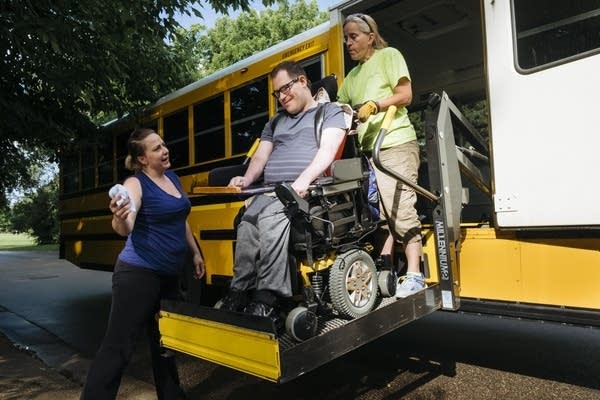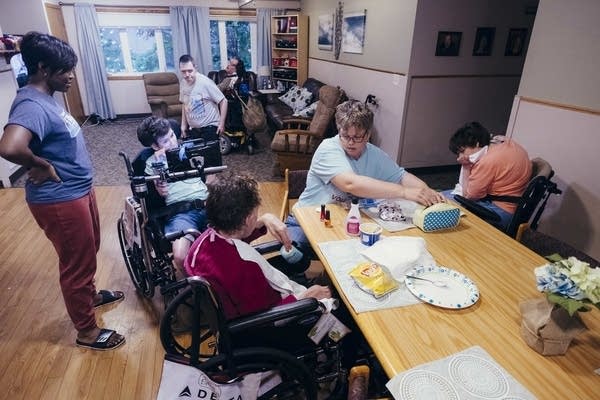'Where God is': Caring for disabled brings struggles, joys

The morning routine for the six people living at the Diane Road Group Home is a lot like yours. They get out of bed, get dressed, have their teeth brushed and eat breakfast, then get on the bus to work.
Before the bus comes, though, there are medicines that must be prepared, wheelchairs moved and breakfasts made. It's work that falls to the group home's caregivers, and each day, it seems, a new challenge tests them.
One day, something wasn't right with Sarah Gonella. Caregiver Cat McNamara, 35, held her up as she walked her from her room to the breakfast table. Gonella fixed her gaze on the ceiling as direct support professional Rosie Moriarty tried to shift her attention to a plate of sausage and French toast.
"Her eyes are, like, crossing," McNamara said. "Let me observe her, maybe she's having a seizure," Moriarty responded.
Create a More Connected Minnesota
MPR News is your trusted resource for the news you need. With your support, MPR News brings accessible, courageous journalism and authentic conversation to everyone - free of paywalls and barriers. Your gift makes a difference.
The caregiver team adjusted quickly. One scanned Gonella's file and prepared the right medication as the house's other two attendants kept a close eye on her while getting everyone else ready. Gonella, 32, stayed at home, sick.
The scene that morning captured — in a few moments — the daily life of a group home caregiver. They play vital roles helping people with disabilities live as independently as possible.

Those who do it say the work is rewarding and satisfying. But it is not easy. Despite the growing need for people like Moriarty, 62, the pay isn't great and not everyone is cut out for it. Those who call Diane Road home have significant physical and intellectual challenges, including cerebral palsy, epilepsy and Down syndrome.
"If we run short, because someone calls in sick or something and we don't have a backup, we are totally... screwed," said Moriarty as she found her coffee and a seat in a quiet moment in a small room that serves as a medicine cabinet, break room and meeting space.
Diane Road offers residents stability, emotional connection and a sense of control over their own lives.
But everyone who lives at Diane Road has their own personality, preferences and medical needs. Caregivers have to keep all of this information handy, and it means things can get complicated quickly.
'Don't want to just grab anyone'
Moriarty started at Diane Road in May, but has been in the industry for four decades, the last 10 years with Living Well Disability Services, the Mendota Heights-based nonprofit that operates 33 groups homes. Nearly all the funding comes from the federal Medicaid program.

She's mom to a son with a disability and has seen him through every iteration of the state's disability service program, including the development of Medicaid.
Medicaid, she said, was one of the best things to happen for people with disabilities, though the erosion of funding has been a strain on caregivers. It increases the level of care they provide and the number of people they're responsible for.
Work keeps going up as the pay stays the same. Caregivers like Moriarty make around $11 an hour doing direct support.

Experience has taught her how to keep a positive attitude under these conditions, but many new to the industry quickly become overwhelmed and sometimes quit. Turnover is a headache.
"It's the highest it's been in a long time, and honestly it's a struggle," said house coordinator Chelsey Knop as she sat at Diane Road's dining room table at the end of a 25-hour shift. On overnight shifts she can sleep part of the night in the house's staff bedroom, but on this day she was ready to leave and get some rest in her own bed.
As the house coordinator, Knop, 27, is in charge of hiring and scheduling all of the house's caregivers. This often means picking up shifts, subbing caregivers from other houses and just taking care of one another.
"The easiest thing is picking up a shift for somebody," Knop says, though sometimes it's doing the little things, like getting birthday card or a favorite kind of coffee keeps spirits high. "People appreciate knowing they are appreciated, it really goes a long ways."
The legal qualifications to be a direct support professional are minimal. There's no state certification and most of the training is provided on the job and online.

Knop knows that not just anyone can step into this job. She's selective with who she interviews, scouring an already thin field for someone who the staff — and more importantly — the residents, find trustworthy.
She uses social media, past co-workers and referrals when she needs to fill a position.
"I don't want to just grab anyone and be like come on in, because it does take a special person to succeed," Knop said, "It takes clients time to warm up to a new person, but they can also sense if you're a nice, genuine person."
'We cannot solve this by ourselves'
Medicaid provides 95 percent of the funding for Living Well Disability Services, according to CEO Julie Manworren. This funds the organization's 33 group homes and its customized services, including in-home, semi-independent and independent living support.
Living Well works to raise money privately, but that help only goes so far. Cuts to Medicaid, something the organization's leaders worry about as Congress considers new tax and health care bills, would be devastating, Manworren said.

"If the state and the federal government reduce their commitment to the people we support, the community is going to be what's left," she said. "We cannot solve this by ourselves."
Besides the daily care, the organization also works to eliminate the stigma around people with disabilities by getting more people involved.
Residents already make regular field trips to concerts, plays and festivals, and Living Well wants them to be even more ingrained their community. They're looking for ways to bring volunteers into the homes and connect residents with their faith communities.
"We have got to reduce the barrier between 'us and them,'" Manworren said.
These social connections are especially important for people who need care around the clock.
As life expectancies rise, more people with disabilities are "aging out" of their original care networks, surviving their parents.

After living in the same group home for 28 years, Jill Evensen fell, breaking bones and forcing her into a nursing home. She moved to Minnesota after her sister Kae Evensen paid her a visit in California, where the two grew up.
"She stopped eating because she was so neglected," Kae said.
At Diane Road, though, Jill, 52, gets her nails painted red, her favorite color. She asks when dinner is going to be ready and talks excitedly about tomorrow's shopping trip to Target, her favorite store.

Said Kae of her sister: "She's not only my hero, but she's where God is."
Caregivers like Moriarty know they could be working elsewhere, flipping burgers or cleaning houses. But she says hamburgers don't smile back at you.
"You're not just their caregiver," said Moriarty. "You're their friend. You're their joking partner, you're their walking partner, you know? They share the most private parts of their lives with you."


